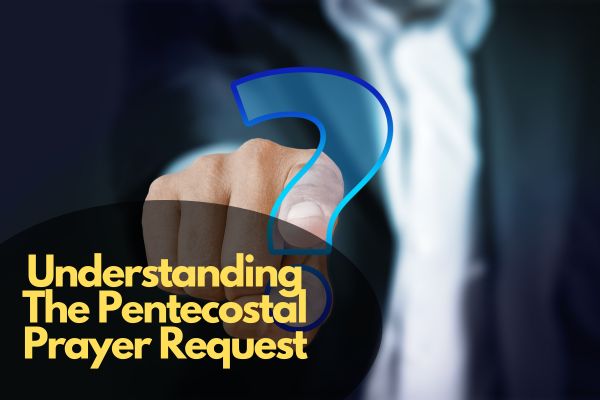Table of Contents Show
Pentecostalism is a branch of Christianity that emphasizes the Holy Spirit’s role in believers’ lives. Pentecostals believe in the baptism of the Holy Spirit, speaking in tongues, and the gifts of the Spirit as described in the New Testament. Prayer is central to Pentecostalism, as it is believed to be a powerful tool for communicating with God and receiving divine guidance and intervention. Pentecostals view prayer as establishing a personal relationship with God and seeking His will for their lives.
Pentecostal prayer request ask for God’s intervention and help in various aspects of life, including health, finances, relationships, and spiritual growth. These pentecostal prayer requests are made in faith, believing that God is able and willing to answer them.
Understanding Pentecostal Prayer Request
Pentecostal prayer requests are specific requests made to God through prayer, asking for His intervention and help in a particular area of life. Pentecostal prayer requests can be made through various means, including personal prayer, group prayer, and online prayer requests. They are usually made in faith, believing God will answer the request according to His will.
Anyone can request Pentecostal prayer, regardless of age, gender, or social status. Pentecostals believe that prayer is a universal language that anyone can understand and that God hears and answers the prayers of all who come to Him in faith.
The Role of Prayer in Pentecostalism
Prayer is considered a vital aspect of the Pentecostal faith, as it is believed to be a direct means of communication with God. Pentecostals view prayer as a way to build a relationship with God and seek His guidance and intervention. Pentecostals believe prayer can change things in both the spiritual and physical worlds. They believe that God can answer prayers according to His will and that prayer can bring miracles and blessings.
Pentecostals practice various forms of prayer, including personal, group, intercessory, and praying in tongues. They also believe in the power of fasting, which is often combined with prayer to seek God’s intervention in a particular area of life.
How Pentecostal Prayer Requests are Answered
Pentecostals believe that God is actively involved in the vworld and can intervene in response to prayer. They believe God is sovereign and can answer prayer miraculously beyond human understanding. Pentecostals believe that faith is essential for prayer to be effective. They believe that without faith, it is impossible to please God or receive His answers to prayer.
Pentecostals often share stories of answered prayer to testify to God’s power and faithfulness. These stories can include physical healings, financial provision, restored relationships, and other miraculous interventions demonstrating God’s presence and power.
The Benefits of Making Pentecostal Prayer Requests
Spiritual benefits
Pentecostal prayer request provides spiritual benefits such as strengthening one’s faith, deepening one’s relationship with God, and providing a sense of spiritual renewal. Pentecostal believers believe in the power of prayer to connect with God and receive divine guidance and intervention in their lives. Prayer can help them feel more connected to their faith and provide a sense of spiritual fulfillment.
Emotional benefits
Pentecostal prayer request can also provide emotional benefits such as reducing stress, providing comfort during difficult times, and promoting inner peace. Prayer can help individuals cope with life’s challenges and provide a sense of hope and optimism. It can also help them feel more connected to their community and provide a sense of social support.
Physical benefits
While no direct scientific evidence suggests that Pentecostal prayer request provides physical benefits, prayer has been shown to affect physical health indirectly. For example, prayer can help reduce stress, a known risk factor for many health problems such as heart disease, high blood pressure, and diabetes. Prayer can also provide a sense of emotional well-being, contributing to overall physical health. Additionally, prayer can promote healthy behaviors such as gratitude, forgiveness, and compassion, linked to improved physical health outcomes.
Conclusion
In conclusion, grasping the significance of Pentecostal prayer request unveils a deep connection to faith, community, and fervent communication with the Divine. The practice not only strengthens individual spirituality but also fosters a sense of unity, as believers come together to uplift one another.
Pentecostal prayer request serve as a powerful expression of reliance on God’s guidance, seeking His intervention in the challenges of life. Through this practice, a vibrant pattern of shared faith and support emerges, illustrating the profound impact of prayer in the Pentecostal tradition.
FAQs
How are Pentecostal prayer request different from other Christian traditions?
- Pentecostal prayer requests are characterized by their spontaneous and passionate nature. Believers often pray aloud, expressing immediate needs or concerns, emphasizing the belief in the Holy Spirit’s direct involvement in their lives.
Is there a specific format for Pentecostal prayer request?
- Pentecostal prayers are generally spontaneous and free-flowing. While there’s no strict format, they often involve personal expressions, fervent pleas, and the expectation of immediate divine response, guided by the belief in the active presence of the Holy Spirit.
How does sharing Pentecostal prayer request impact the community?
- Sharing prayer requests in the Pentecostal community fosters a sense of unity and support. It creates a space for believers to come together, empathize with one another, and collectively seek God’s intervention, strengthening the bonds of faith and community.








